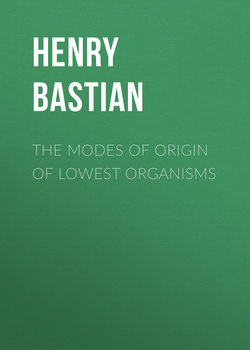The modes of origin of lowest organisms

Реклама. ООО «ЛитРес», ИНН: 7719571260.
Оглавление
Bastian Henry Charlton. The modes of origin of lowest organisms
THE MODES OF ORIGIN. OF. LOWEST ORGANISMS
I. Homogenetic Mode of Origin of Bacteria and Torulæ
2. Heterogenetic Mode of Origin of Bacteria and of Torulæ
3. Origin of Bacteria and of Torulæ by Archebiosis
COMPARATIVE EXPERIMENTS
First Set of Experiments (I.–XV.)
Second Set of Experiments (XVI.–XXI.)
Third Set of Experiments (XXII.–XXX.)
Fourth Set of Experiments (XXXI.–XXXVII.)
Fifth Set of Experiments (XXXVIII.–XLVII.)
Sixth Set of Experiments (XLVIII.–LXV.)
Отрывок из книги
The mode of origin of Bacteria, and, to a less extent, of Torulæ, has been much discussed of late, and many different views have been advocated on this subject by successive writers.
It is of much importance to bear in mind when such views are under consideration, that a short time since nothing was positively known concerning the life-history of these organisms. However strongly, therefore, certain persons are inclined to rely upon the analogy which is supposed to obtain between these doubtful cases, and the multitudes of known cases – in which it can be shown that organisms are the offspring of pre-existing organisms – it must always be borne in mind that in many of the doubtful cases, where the simplest organisms are concerned, there is also an analogical argument of almost equal weight adducible in favour of their de novo origination – after a fashion, and under the influence of laws similar to those by which crystals arise. To rely too exclusively upon an argument from analogy is always perilous: it is more than usually so, however, in a case like this, where what is practically an opposing analogy may be deemed to speak just as authoritatively in an opposite direction.
.....
To establish the position that Bacteria are occasional links in the life-history of fungi, it would be only necessary to show that some of the Bacteria which develop into fungi through Leptothrix have derived their origin from pre-existing fungi. This is the view which Hallier2 has endeavoured to establish; it is also the doctrine of M. Polotebnow,3 and one, moreover, to which Professor Huxley4 inclines. Even this mode of origin for Bacteria, however, has not been so decisively established as might be desired. With regard to Torulæ, we do possess sufficient evidence tending to show that some of them may arise from pre-existing fungi, and we are equally certain that some gonidial cells are thrown off from lichens. The analogical evidence is, therefore, in favour of the view that minute particles which are budded off from the mycelium of certain fungi, may subsequently lead an independent existence, and multiply in the form of Bacteria– although many of the cases in which such buds seem to be given off, may be merely cases in which co-existing Bacteria have become adherent to fungus filaments or to Torulæ.5
But, with reference to these supposed cases of budding, and also to those others in which the contents of a spore or sporangium break up into what Professor Hallier calls “micrococci” (which are generally incipient Bacteria), it would be difficult for us to decide whether such processes are normal or abnormal. When we have to do with such organisms, in fact, there may be the nicest transitions between what is called Homogenesis, and what, when occurring in other organisms, we term Heterogenesis. It may be that the production of such “micrococci” from the spore or sporangium of the fungus is not an invariable incident in the life-history of the species, but rather an occasional result of the influence of unusual conditions, or of failing vigour on the part of the organism. In this latter case we should have to do with a process of Heterogenesis; although, as I have just stated, in respect to such low and changeable organisms, scarcely any distinct line of demarcation can be drawn between Homogenesis and Heterogenesis.
.....